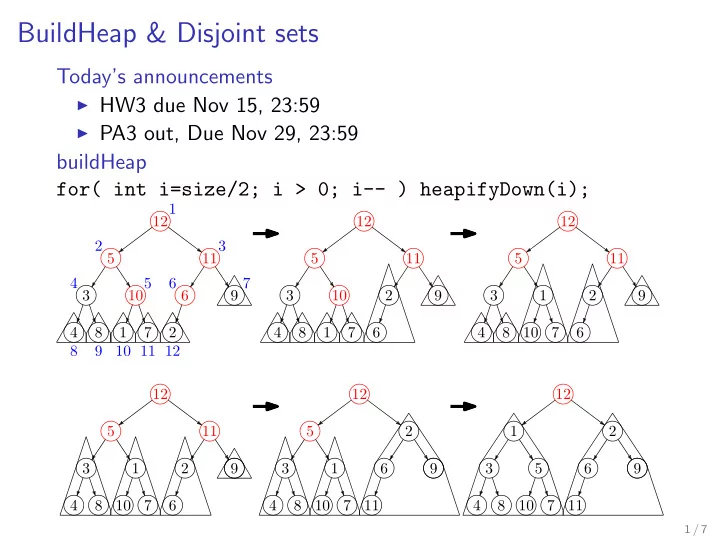

BuildHeap & Disjoint sets Today’s announcements ◮ HW3 due Nov 15, 23:59 ◮ PA3 out, Due Nov 29, 23:59 buildHeap for( int i=size/2; i > 0; i-- ) heapifyDown(i); 1 12 12 12 2 3 5 11 5 11 5 11 4 5 6 7 3 10 6 9 3 10 2 9 3 1 2 9 4 8 1 7 2 4 8 1 7 6 4 8 10 7 6 8 9 10 11 12 12 12 12 5 11 5 2 1 2 3 1 2 9 3 1 6 9 3 5 6 9 4 8 10 7 6 4 8 10 7 11 4 8 10 7 11 1 / 7
BuildHeap runtime: Charging scheme $ $ $ $ $ $ $ $ $ $ $ $ $ $ • Place a dollar on each edge of the heap. • Use $’s on leftmost unspent path from node v to a leaf to pay for heapifyDown(v) . • Show (by induction) when heapifyDown(v) is called, both children of v have an unspent path (the rightmost path) to a leaf. 2 / 7
Heapsort 1. Call buildHeap on the input array. 2. Repeat n times: Perform removeMin Worst Case: 3 / 7
Disjoint Sets gorilla chimp panda raccoon human bear human chimp human chimp gorilla bear panda bear raccoon panda bear human gorilla chimp raccoon panda 4 / 7
Disjoint Sets ADT Maintain a collection S = { S 1 , S 2 , . . . , S k } of disjoint sets. Each set has a representative element. Disjoint Sets operations ◮ void MakeSet(const T & k) ◮ void Union(const T & k1, const T & k2) ◮ T & Find(const T & k) How would you represent S = {{ 0 , 1 , 4 } , { 2 , 7 } , { 3 , 5 , 6 }} ? 0 1 2 3 4 5 6 7 Find Union 5 / 7
Disjoint Sets using UpTrees 0 2 3 8 S = {{ 0 , 1 , 4 } , { 2 , 7 } , { 3 , 5 , 6 } , { 8 }} 1 7 5 6 0 1 2 3 4 5 6 7 8 parent 4 0 0 2 3 1 3 3 2 8 Find runtime depends on? int DS::Find( int k ) { if( parent[k] == k ) return k; else return Find( parent[k] ); } void DS::Union(int root1, int root2) { parent[root__] = root__; } 6 / 7
Smart Union 0 3 5 6 8 1 4 Union by height Choose root to minimize height. Union by size Choose root to minimize total depth. Following either scheme guarantees tree with n nodes has height: 7 / 7
Recommend
More recommend